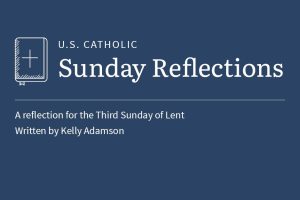Using their voice
I applaud the students of Shelly’s Voice Advocacy Group for standing up to the Indianapolis archdiocese in defense of their teacher, Shelly Fitzgerald (“Speak up,” Expert Witness, November). I have to wonder what the archdiocese hoped to accomplish by firing their teacher. A gay teacher is not going to “turn a straight student gay.” An individual’s sexual attraction and preference is innate. To deny a person the opportunity to make a living because of who they are and how they were born is un-Christian and un-Catholic.
—bluestockton, via uscatholic.org
I admire these students. They turned to their faith knowing that Jesus accepts all of God’s children. That is not hard to understand. Moreover, whether this teacher has a significant person in her life who is the same sex as she in no way affects how she teaches.
—JoAnn Kunkle, via Facebook
I think you can love someone and still not approve of their lifestyle. Think of Jesus and the Samaritan woman at the well. He called her out on living with someone in sin, but he still loved her. I applaud these teens for showing how much they love their teacher. But I also think you can acknowledge someone has sinned while loving them. I don’t say it’s easy, but Christ showed us how to do it.
—gail giddings, via uscatholic.org
This is a wonderful action by these students. Jesus didn’t instruct us to love everyone except for certain people. He said to love everyone. Unless a teacher or counselor is teaching or advocating against church laws, they should be left to do their job in peace.
—Lynne Miller, via uscatholic.org
Reform lesson
In my opinion, Colleen Carroll Campbell’s essay on church reformer Angélique Arnauld proves that reform needs to be enacted when it is needed and not for the sake of reform alone (“A cautionary tale,” November). To keep following human-made rules that are no longer valid is as wrong as changing traditions and practices that reveal God and God’s divine mercy.
A good example of this is the issue of celibacy among priests in the Amazon, addressed at the recent synod as perhaps in need of abolishing. My understanding is celibacy was first instituted for Catholic clergy in the 11th century. Prior to that, to remain celibate was a personal choice. In other words, a priest could consecrate himself to a life of celibacy and God, but it was his choice. Otherwise, he could marry and still fulfill a priestly vocation.
—Michael Camarata, via uscatholic.org
Deserving of support
In your recent Q&A with Father James Martin, his answer to Catholics who believe LGBTQ people should not be members of religious communities is “They’re already here” (“Retreats for gay clergy deserve our support, says Father James Martin,” uscatholic.org). My response to them is to read the New Testament. Read it and count the admonitions against judgment, hypocrisy, and heartlessness.
Consider the judgments the apostles levied against the woman who anointed Jesus. Count the admonitions against self-righteousness. Then count the exhortations to love your brethren and take a look at the people Jesus gathered around him. Count the number of times Jesus even mentions sexuality: You will find none. What you will find, however, is that to perceive the kingdom of God each of us must look with the eyes of our hearts and let go of judgment against others.
—Sara Jayara, via Facebook
Most of the people within the Catholic community I belong to support gay priests. I think people have started to come to see that a priest’s sexual orientation doesn’t matter—only his pastoral outreach does.
—Jeannine Gramick, via uscatholic.org
I think if any progress is to be made in developing a ministry and a spiritual discipline for gay Catholics, it will require the help of the church, which is not giving such help now. Instead, the church condones programs such as Courage, a ministry for LGBTQ people that encourages shame, secrecy, and a 12-step type of approach to what is erroneously called an “intrinsic disorder.”
—Bruce Lewis, via Facebook
I’m grateful for the ministry of LGBTQ and straight people alike, and I’m glad there are retreats that are supportive of our LGBTQ brothers and sisters.
—Louise Heatley (@_louiseheatley), via Twitter
I can’t understand why any practicing Roman Catholic would be against someone who is gay or against retreats for gay clergy. Nobody should assume that a priest or lay minister is not chaste just because they are LGBTQ. LGBTQ clergy are like every other practicing Catholic. Also, there are many LGBTQ people in this world, and Jesus loves every human being. We are all his children.
—RoseMarie Munn, via uscatholic.org
I support gay priests. God doesn’t make mistakes. Ever. God created everyone, including people of all sexual orientations. Many Christians want to find a scapegoat for every situation under the sun and paint sexual differences as the most unforgivable sin of all. I believe that on the other side of this life, no such bigotry exists. Not even a little bit.
—Carol Larson, via Facebook
Spiritual labor
I can fully understand how the ministers in Teresa Coda’s article about ministry burnout feel (“Burned out,” November). I wish we had more people in my archdiocese studying to be lay ecclesial ministers. The church needs to pay better attention to the needs of people serving as lay ecclesial ministers and do more to support the men and women who serve their churches in ministry.
—Marianne Cannestra, via Facebook
Go green
I think a parish green team is a brilliant idea (“Green your parish,” Reader Survey, November). Every parish should have one. At my parish we have what we call a “global healing group,” because our bishops set up a global healing initiative to promote Laudato Si’ (On Care for Our Common Home). Catholics need to start showing that they care about the planet and the animals who share our common home. A parish green group is a perfect way to do that.
—Vee Bell, via uscatholic.org
Image: Pixabay















Add comment